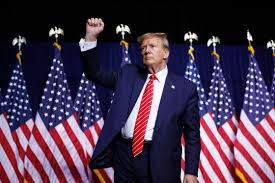Donald Trump Wins the 2024 Presidential Election
- paolo bibat
- Feb 23, 2025
- 3 min read
Updated: Mar 9, 2025

In a stunning political comeback that has left the world in awe, Donald Trump has been elected the 47th President of the United States, marking one of the most dramatic chapters in American political history.
The 2024 election, billed as a battle for the soul of the nation, has culminated in a victory for Trump, who defied polls, pundits, and an army of critics to reclaim the Oval Office.
This is not just a win; it is a seismic shift in the American political landscape, one that will reverberate for generations to come.
From the moment Trump announced his candidacy in early 2023, it was clear that this would be no ordinary election. His campaign, a potent mix of populist rhetoric, unrelenting energy, and a mastery of media dynamics, galvanized his base while drawing sharp contrasts with his opponents. Running on a platform of “America First 2.0,” Trump promised to revive the economy, secure the border, and restore what he called “the greatness we’ve lost.” His message resonated deeply with millions of Americans who felt disillusioned by rising inflation, cultural divisions, and a sense that the country was adrift.
The road to victory was anything but smooth. Trump faced fierce opposition from within his own party during the primaries, with critics arguing that his polarizing style and legal challenges would make him unelectable in a general election. Yet, one by one, his rivals fell, unable to match the loyalty he commanded among Republican voters. By the time the GOP convention rolled around, Trump had solidified his position as the party’s standard-bearer, delivering a fiery acceptance speech that set the tone for the months ahead.
The general election was a bruising battle, pitting Trump against incumbent President Joe Biden in a rematch of the 2020 contest. Biden, campaigning on a message of unity and continuity, sought to portray Trump as a threat to democracy.
But Trump’s campaign, fueled by massive rallies and a relentless focus on economic issues, gained momentum as Election Day approached. Key swing states like Pennsylvania, Michigan, and Wisconsin became the focal points of a bitterly contested race, with both sides pouring resources into voter mobilization efforts.
On election night, the results came in like a slow-moving tsunami. Early returns showed Biden leading in several battleground states, but as the night wore on, Trump began to close the gap. By the early hours of the morning, it became clear that the “Red Wave” Trump had predicted was materializing. States that had narrowly gone for Biden in 2020 flipped back to Trump, driven by strong turnout among working-class voters and rural communities. When the final results were announced, Trump had secured 290 electoral votes, surpassing the 270 needed to win.
In his victory speech, delivered at Mar-a-Lago before a crowd of jubilant supporters, Trump struck a tone of triumph and reconciliation. “This is not just a victory for me,” he declared, “but for every American who believes in the promise of this great nation. Together, we will rebuild, renew, and restore the American Dream.” The speech was classic Trump—bold, optimistic, and unapologetically patriotic.
The reaction to Trump’s victory has been as polarized as the election itself. His supporters have celebrated the result as a vindication of his policies and a rejection of the status quo. “This is what democracy looks like,” said one Trump supporter in Ohio. “The people have spoken, and they want change.”
Meanwhile, his critics have expressed deep concern about the implications of his return to power. “This is a dark day for America,” said a Democratic congresswoman from California. “We must now prepare to fight for the values we hold dear.”
Internationally, the reaction has been mixed. Allies in Europe and Asia have cautiously congratulated Trump, while leaders in countries like China and Iran have signaled apprehension about what his presidency might mean for global stability. Markets, initially volatile, have stabilized as investors weigh the potential impact of Trump’s policies on trade, energy, and geopolitics.
As Trump prepares to take office in January 2025, the challenges ahead are immense. He inherits a nation deeply divided, with economic uncertainty, social unrest, and a fractured political system. Yet, if his first term is any indication, Trump will approach the presidency with the same unyielding determination that has defined his career. Love him or loathe him, there is no denying that Donald Trump has once again reshaped the political landscape.
The 2024 election will be remembered as a turning point in American history—a moment when the nation chose a path that few could have predicted. Whether this decision leads to renewal or further division remains to be seen. But one thing is certain: the Trump era is far from over. In fact, it may have just begun.


































